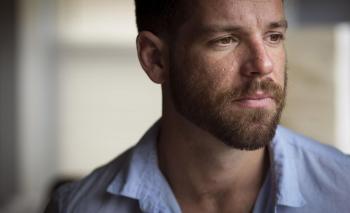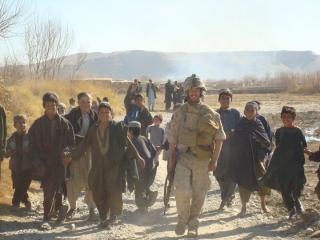Even though Thomas Burke ’18 M.Div. grew up in a religious household in a nearby Connecticut town, he didn’t expect to be studying theology at Yale Divinity School. In fact, the short journey from Bethel to New Haven took him many years and around the world.
After graduating from high school, Burke enlisted in the Marine Corps. Unlike many other 18-year-olds, Burke was already thinking theologically. He joined the military while asking questions about what it means to be human and live a good life: “I was looking for meaning; I was looking for a heroic life,” he explains. He saw the military as an opportunity for a meaningful life—and even, potentially, a meaningful death.
 Burke was in the First Battalion Third Marines out of Kaneohe Bay, Hawaii. After going through boot camp at Parris Island, South Carolina, he served as an infantry rifleman Marine from 2007 to 2011 . He was deployed in Iraq as a turret gunner in 2008 and in Afghanistan a designated marksman and team leader in 2010.
Burke was in the First Battalion Third Marines out of Kaneohe Bay, Hawaii. After going through boot camp at Parris Island, South Carolina, he served as an infantry rifleman Marine from 2007 to 2011 . He was deployed in Iraq as a turret gunner in 2008 and in Afghanistan a designated marksman and team leader in 2010.
Enlistment in the military was on his mind long before his high school graduation. His Catholic upbringing instilled in Burke a love for ritual, community, uniform, and hierarchy. It was a well-ordered world, and he found it mesmerizing. Burke recalls the pronouncement he made as a seven-year-old: “I’m either going to join the military, or become a Catholic priest.” He did the first; now he’s discerning the second through formation at YDS.
As an enlisted Marine, Burke saw combat firsthand. He’s not shy about discussing the needs and struggles of vets; in fact, he’s one of his community’s best advocates. He was one of the first post-9/11 combat veterans to graduate from Sacred Heart University, which now—thanks in large part to Burke’s efforts—boasts programs suited especially for those returning home from war. He gives talks, writes editorials, works with Congress members on policy issues, and helps run a nonprofit that supports vets in finding community and staying physically active.
“Fitness is one of the single most powerful ways to help vets reintegrate into society,” Burke explains of his nonprofit work. “It’s something tangible, something that makes a person feel accomplished and productive when they don’t feel that way in other parts of their lives.” He is also active in prison ministry and pastoral care for returning vets, as both groups—inmates and vets—struggle with issues of identity, marginalization, societally uncommon experiences, and the need for reintegration.
 In addition to all this, Burke patiently and honestly instructs his classmates, through words and deeds, on what it means to be a returning soldier, returning to the classroom. To the great delight of YDS students, staff, and faculty, his therapy dog, Rosie, is a just as much a member of the community as Burke.
In addition to all this, Burke patiently and honestly instructs his classmates, through words and deeds, on what it means to be a returning soldier, returning to the classroom. To the great delight of YDS students, staff, and faculty, his therapy dog, Rosie, is a just as much a member of the community as Burke.
As an enlisted soldier, Burke also witnessed firsthand the common human family. “I saw how beautiful Islam was, I saw my neighbors praying five times a day, I witnessed them being truly devoted in their faith—really submitting their will to God. Before joining the military, I had known nothing outside my own tradition,” he says.
Graduate studies in religion interested Burke not only because of his engagement with Islam or his childhood enchantment with Catholicism, but because he was inspired by the role of community in undertaking a shared goal. “I had a feeling Yale was going to be similar to my Marine Corps community,” he explains, “a group of exceptional individuals, sharing a short but formative time together, striving toward a common mission.” The most salient similarity? “They’re both self-selecting demographics! So you know each person is going to be committed to investing, learning, and growing as much as they can. This is what made me sure that YDS would be amazing.”
For the most part, the YDS community has been amazing: Burke has immersed himself in the wide-ranging concerns of the diverse student body, read and written scores of theologically compelling texts, and taken opportunities to serve and volunteer with groups outside the walls of YDS.
But there is always work to do when reintegrating veterans back into society. Burke offers a few statistics: “There are only a few vets at YDS; only a handful of vets at the undergrad campus. Compare that to other Ivy League schools, where there are some programs specifically dedicated to vets, in which hundreds of returning soldiers are enrolled.”
After starting a non-degree-seeking program his first year, Burke was admitted to the M.Div. program in his second year of studies. “I was honest on my application about the struggles of being a veteran, including PTSD, and I think that was difficult to understand from an administration standpoint. I proved in that first year that I would be a stable, successful member of the community.” Though he laments having to prove it, he knows he is a trailblazer for future war veterans who want to enroll at YDS.
Burke’s learning at YDS has given YDS an opportunity to do some learning, too. Creating classrooms tailored to the specific needs of a returning soldier can admittedly take some time—and YDS is committed to working with, learning from, and serving the veteran population.
Ellen B. Koneck is a second-year M.A.R. student interested in Roman Catholic theology. She has previously written for Commonweal and Whether